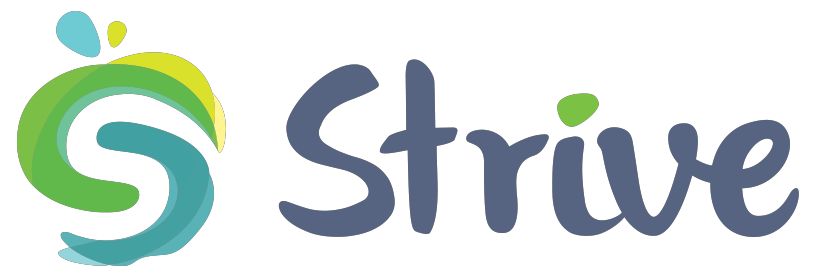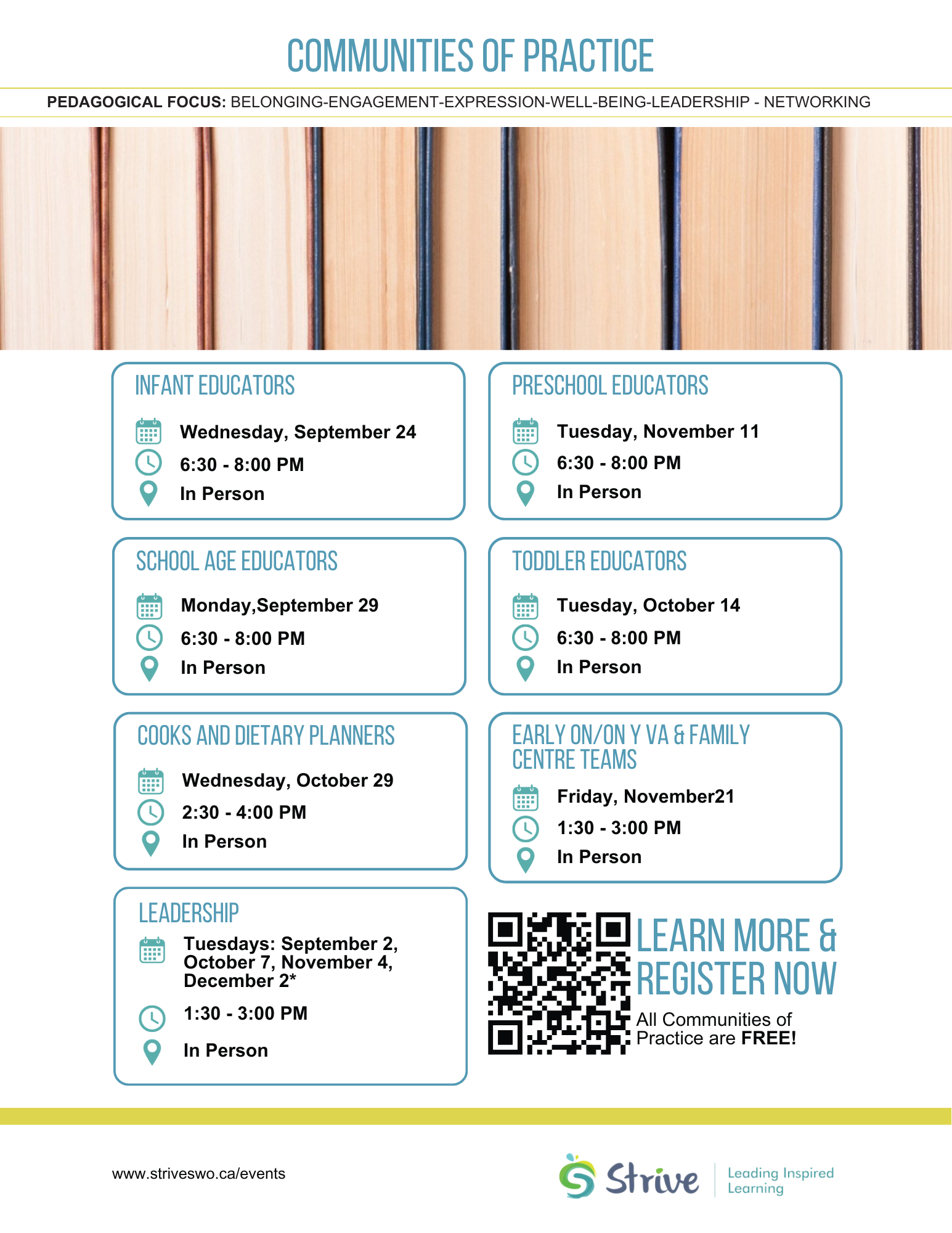BUILDING ON OUR KNOWLEDGE OF COPs
Strive is thrilled to continue to offer opportunities this Fall to engage as a community through our Communities of Practices (CoPs)! Let’s dig deeper into how we can offer opportunities for each other to engage in exciting and relevant pedagogical conversations!
What is a CoP?
In Early Childhood Education and Care (ECEC), “the term communities of practice is a group of people who share a concern or a passion for something they do and learn how to do it better as they interact regularly over time” (Curtis et al., 2013, p.14). At Strive, we currently offer a variety of CoPs: infant, toddler, preschool, school age, leadership, cooks & dietary planners, and Early ON/ON Y VA & Family Centres!
What formats do CoPs get offered in?
In-person: Allowing members to connect face-to-face
Online: Enabling collaboration across borders and barriers
Hybrid: This is a combination of both in-person and online interactions to maximize the benefits of each mode of engagement.
Starting this September, Strive will be moving all CoPs to in-person in order to engage deeply together! We hope that this intentional shift will help us bring our authentic selves and foster opportunities to dig deeper into our work and support one another. We can’t wait to see everyone gathered!
How do facilitators decide what to talk about during a CoP?
Largely, the information comes from you (the participants)! This means we also can’t do these sessions without you! What does this mean for you as a participant?
This means we ask that you offer topics of conversation through the intake questions - “Please share any topics you'd like to discuss at this CoP.” This doesn’t mean you need to be an expert on a topic but rather, that you come in curious and willing to engage with others on a question, challenge, idea, or script! This part of the process also allows the facilitator to prepare themselves so they can better facilitate the CoP gathering.
Occasionally, facilitators may have topics of conversation to offer or help guide the conversation. Typically, these come from lived experiences as most facilitators are currently working within early years programs and can, therefore, speak to moments that other participants relate to, as well!
What is the role of the facilitator in a COP?
Facilitators are available and engaged alongside participants in a CoP to help guide the conversation and help make connections. The facilitator is also there to support those who may be slightly uncomfortable joining to collaborate with individuals they may not have met before.
Facilitators support keeping the conversation moving without taking over the conversation. Their goal is to support you as a community in having a strong dialogue amongst yourselves.
Facilitators are also there to help support the community through agreements to create conditions for a safe space to question, wonder, and think together!
What is your role as a participant in a CoP?
Suggest a topic for conversation: What is something you’ve been noticing in your work lately? What has been going really well? What has been really challenging? What has been confusing that you’d like to speak to others about?
Bring artifacts such as program planners, observations, notes, questions, stories, photos (but remember to keep confidentiality in mind!), etc., to speak about or share. Having the artifact to lean on in conversation can be particularly supportive as the CoP group is in the beginning stages of getting comfortable together. Artifacts can also support the accuracy of conversation and ensure that conversations are constructive and supportive to the individual who is presenting them.
Most of all, be prepared to engage and speak with one another! Understand that the purpose of a CoP is to create community; the more you regularly attend and engage, the more relationships and comfort you will create within that community! In CoPs, the facilitator does not provide a workshop-style presentation; the group of gathering professionals sets the tone and guides where the conversation will go from meeting to meeting.
Offer feedback. Whether to other participants, the facilitator, through the professional learning feedback survey, feedback is important! It offers new perspectives, ideas, learning and opportunities for growth when we offer constructive feedback.
How do you choose a CoP to join?
Identify your interest(s): Determine the specific area(s) of Early Childhood Education and Care (ECEC) that are the most interesting and/or relevant to you.
Research existing CoPs: Look for CoPs that focus on your chosen area of interest. You can find CoPs through professional organizations, educational institutions, online platforms, and social media groups.
Attend meetings or events: If the CoP holds regular meetings or events, attend them to get a feel for the group’s focus, dynamics, and relevance to your professional goals.
Introduce yourself and participate: Once you’ve identified a CoP that aligns with your interests, introduce yourself to the group. Participate actively in discussions, share your experiences, and contribute resources or insights that can benefit other members. Diversify the conversation with your unique voice.
Commit to learning and collaboration: Engage consistently with the CoP by attending meetings and/or participating in online discussions and staying updated on relevant resources and developments in the field.
Choose a CoP that best supports you! A CoP isn’t a webinar or presentation, so attending a CoP that you wouldn’t be able to speak to might not be supportive of your goals. Strive offers a number of other professional learning opportunities for you to network and learn about different parts of our field. Check out our events page to learn more!
Resources to support your learning:
READ: Check out last year’s CoP blog post to dig into the details of CoPs: www.striveswo.ca/blog-posts/guiding-growth-the-role-of-communites-of-practice-in-professional-learning
LISTEN: In this episode, Ally, Strive Manager, and Kayla (KP!), Strive Community Animator, explore our Communities of Practice: how they can help you connect, engage, and grow as an educator! Listen, learn, reflect, enjoy! Ep: 59 – Communities of Practice: www.striveswo.ca/podcast-posts/ep-59
WATCH: If you learn better through visuals, try watching this video to gain a better understanding of the overview of CoPs: www.youtube.com/watch?v=SmqLyOLIjos&t=57s
Are there any upcoming CoPs you’re attending? Share with us below!
References
Curtis, D., Lebo, D., Cividanes, W. C. M., & Carter, M. (2013). Reflecting in communities of practice: A Workbook for Early Childhood Educators.


